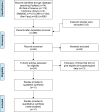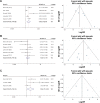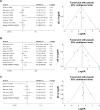The clinicopathological and prognostic value of HSP27 in hepatocellular carcinoma: a systematic review and meta-analysis
- PMID: 29563808
- PMCID: PMC5846765
- DOI: 10.2147/OTT.S154227
The clinicopathological and prognostic value of HSP27 in hepatocellular carcinoma: a systematic review and meta-analysis
Abstract
Background: In the recent past, there is increasing evidence demonstrating that HSP27 plays a key role in tumor progression. However, the relationship between HSP27 expression and the clinicopathological features of hepatocellular carcinoma (HCC), as well as its prognostic value in HCC patients remain controversial. Accordingly, we conducted a meta-analysis to assess the correlation between HSP27 expression and HCC, and determine the prognostic value of HSP27 in HCC.
Methods: The data included clinicopathological features and survival information extracted from the published literature in the databases PubMed, EMBASE, Cochrane Library, Web of Science, CNKI, and Wan Fang. The pooled odds ratios and hazard ratios with 95% CIs were calculated using Forest plot analysis.
Results: The meta-analysis results indicated that the positive HSP27 expression was significantly correlated with HCC incidence, tumor differentiation, and α-fetoprotein level in patients with HCC. However, the expression of HSP27 was not associated with metastasis, hepatitis B virus surface antigen, gender, tumor size, TNM stage, and vascular invasion. Additionally, HSP27 expression indicated a poor overall survival rate, but it was not related to disease-free survival rate.
Conclusion: This meta-analysis revealed that HSP27 may play a key role in the development of HCC and could be a reliable biomarker for the prognosis of patients with HCC. However, additional high-quality research is needed to support the results.
Keywords: HCC; heat shock protein 27; meta-analysis.
Conflict of interest statement
Disclosure The authors report no conflicts of interest in this work.
Figures





Similar articles
-
Clinicopathological and prognostic significance of heat shock proteins in hepatocellular carcinoma: a systematic review and meta-analysis.Front Oncol. 2023 Aug 4;13:1169979. doi: 10.3389/fonc.2023.1169979. eCollection 2023. Front Oncol. 2023. PMID: 37601679 Free PMC article.
-
Clinicopathological significance of HSP27 in gastric cancer: a meta-analysis.Onco Targets Ther. 2017 Sep 13;10:4543-4551. doi: 10.2147/OTT.S146590. eCollection 2017. Onco Targets Ther. 2017. PMID: 28979146 Free PMC article. Review.
-
Clinicopathological significance and prognostic role of p-STAT3 in patients with hepatocellular carcinoma.Onco Targets Ther. 2018 Mar 5;11:1203-1214. doi: 10.2147/OTT.S156198. eCollection 2018. Onco Targets Ther. 2018. PMID: 29551899 Free PMC article.
-
Clinicopathological and prognostic significance of FoxM1 in hepatocellular carcinoma patients: a meta-analysis.Onco Targets Ther. 2018 Jun 19;11:3561-3571. doi: 10.2147/OTT.S155541. eCollection 2018. Onco Targets Ther. 2018. PMID: 29950861 Free PMC article.
-
Clinicopathological and prognostic significance of OCT4 in patients with hepatocellular carcinoma: a meta-analysis.Onco Targets Ther. 2017 Dec 21;11:47-57. doi: 10.2147/OTT.S151390. eCollection 2018. Onco Targets Ther. 2017. PMID: 29317833 Free PMC article. Review.
Cited by
-
Discovery of Novel HSP27 Inhibitors as Prospective Anti-Cancer Agents Utilizing Computer-Assisted Therapeutic Discovery Approaches.Cells. 2022 Aug 4;11(15):2412. doi: 10.3390/cells11152412. Cells. 2022. PMID: 35954254 Free PMC article.
-
The Role of Hsp27 in Chemotherapy Resistance.Biomedicines. 2022 Apr 14;10(4):897. doi: 10.3390/biomedicines10040897. Biomedicines. 2022. PMID: 35453647 Free PMC article. Review.
-
Serum levels of anti-heat shock protein 27 antibodies in patients with chronic liver disease.Cell Stress Chaperones. 2021 Jan;26(1):151-157. doi: 10.1007/s12192-020-01164-3. Epub 2020 Sep 7. Cell Stress Chaperones. 2021. PMID: 32895883 Free PMC article.
-
Clinicopathological and prognostic significance of heat shock proteins in hepatocellular carcinoma: a systematic review and meta-analysis.Front Oncol. 2023 Aug 4;13:1169979. doi: 10.3389/fonc.2023.1169979. eCollection 2023. Front Oncol. 2023. PMID: 37601679 Free PMC article.
-
Global profiling of O-GlcNAcylated and/or phosphorylated proteins in hepatoblastoma.Signal Transduct Target Ther. 2019 Oct 11;4:40. doi: 10.1038/s41392-019-0067-4. eCollection 2019. Signal Transduct Target Ther. 2019. PMID: 31637018 Free PMC article.
References
-
- Marquardt JU, Thorgeirsson SS. SnapShot: Hepatocellular carcinoma. Cancer Cell. 2014;25(4):550.e1. - PubMed
-
- Siegel R, Naishadham D, Jemal A. Cancer statistics, 2012. CA Cancer J Clin. 2012;62(1):10–29. - PubMed
-
- Forner A, Llovet JM, Bruix J. Hepatocellular carcinoma. Lancet. 2012;379(9822):1245–1255. - PubMed
-
- Avila MA, Berasain C, Sangro B, Prieto J. New therapies for hepatocellular carcinoma. Oncogene. 2006;25(27):3866–3884. - PubMed
LinkOut - more resources
Full Text Sources
Other Literature Sources
Research Materials
Miscellaneous

